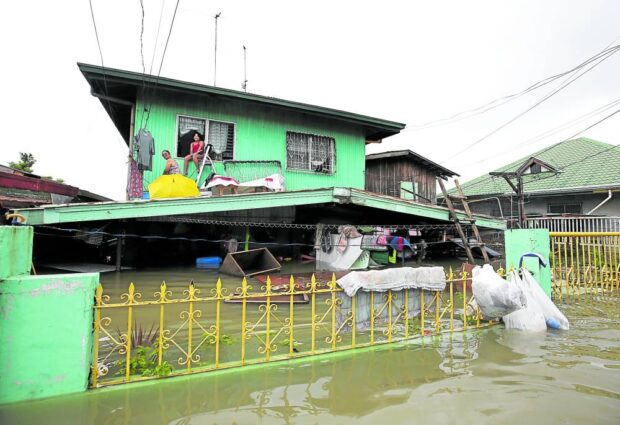
STAYING DRY | Members of a family at Barangay Frances in Calumpit, Bulacan, are forced to stay on the second floor of their house as floodwater claims the ground floor. Bulacan officials have placed the province under a state of calamity due to severe flooding in several towns following heavy rains dumped by Typhoon Egay (Doksuri) and due to the southwest monsoon. (Photo by LYN RILLON / Philippine Daily Inquirer)
Although Typhoon Egay (international name: Doksuri) left the Philippine area of responsibility (PAR) last week, its effects continue to be felt with the National Disaster Risk Reduction and Management Council (NDRRMC) reporting on Monday that around 2.3 million people or 654,837 families across 13 regions were affected.
The NDRRMC also placed the official death toll at 25 although only two had been confirmed with the rest still being verified. (See related story on this page.) Those reported injured and missing remained at 52 and 20, respectively.
The number of evacuees was estimated at 312,000, with some staying in 737 shelters nationwide.
While the NDRRMC earlier placed the damage caused by Egay at P5.9 billion (P4.4 billion for infrastructure and P1.5 billion for agriculture), it corrected the figure on Monday, pegging the total at P5.4 billion (P3.5 billion for infrastructure and P1.9 billion for agriculture).
So far, a state of calamity has been declared in at least 16 provinces, towns, and cities in Luzon where Egay left a trail of destruction.
The latest was Cagayan province, as approved by the provincial board through a resolution on Monday, after 26 towns and a city took the brunt of the typhoon’s wrath, leaving P465 million worth of agricultural losses and P862.3 million worth of damaged infrastructure.
The hardest hit were the towns of Sanchez Mira, Aparri, Sta Ana, Abulug, Calayan, and Sta. Teresita.
Data from the local disaster risk reduction and management offices showed that Egay affected 22,291 families or 116,000 people across the province.
In Bulacan, the provincial board also approved on Sunday a resolution declaring a state of calamity after incessant rains at the height of the typhoon caused widespread flooding that reached 1.82 meters (6 feet) and submerged low-lying areas in all 24 localities.
At least four people died either due to drowning or after suffering severe injuries while fleeing from the floods.
Pampanga was also placed under a state of calamity on Monday after the province suffered from massive flooding. Earlier, the municipal councils in Sto. Tomas, Macabebe, San Simon and Minalin declared a state of calamity due to rain-induced floods.
Data from the Regional Disaster Risk Reduction and Management Council on Monday showed that 438 areas in Central Luzon were submerged in floodwaters, affecting at least 341,242 families, or 1,195,886 individuals, and leaving P595,643,090 worth of damage to agriculture.
Earlier, the local governments of Ilocos Norte, Ilocos Sur, Abra, Mountain Province, Bataan, Cavite, Sablayan (Occidental Mindoro), Calasiao (Pangasinan) and Dagupan City also declared a state of calamity and accessed their quick response funds to aid affected residents.
More rains expected
On the other hand, Typhoon Falcon (international name: Khanun) strengthened on Monday as it continues to enhance the southwest monsoon or “habagat” and bring heavy rainfall over parts of Luzon and Western Visayas, according to the Philippine Atmospheric, Geophysical and Astronomical Services Administration (Pagasa).
Based on its 4 p.m. weather bulletin, Falcon’s maximum sustained winds were at 165 kilometers per hour (kph) and gusts of up to 205 kph.
Moving north northwest at 15 kph, the typhoon was last located 1,015 km east northeast of extreme northern Luzon.
But the hoisting of wind signals due to the typhoon remains unlikely. During Pagasa’s morning press briefing, Assistant Weather Services chief Chris Perez said there was a low possibility that Falcon would make landfall over any part of the country.
Based on the track forecast, it may exit the PAR by Tuesday night and head for Ryukyu Archipelago in Japan.
Even if it does not make landfall in the PAR, Falcon and the southwest monsoon will continue to bring monsoon rains to the western portion of Luzon and the Visayas which are still reeling from the impact of Egay.
Pagasa said monsoon rains would prevail over Zambales and Bataan provinces while Metro Manila, Pangasinan, Tarlac, Pampanga, Bulacan, and Occidental Mindoro would have occasional downpours.
The Cordillera, Cagayan Valley, Western Visayas, the other parts of Ilocos, Central Luzon, and Southern Tagalog regions will have cloudy skies with scattered rainshowers and thunderstorms, Pagasa said.
The rest of the country will have partly cloudy to cloudy skies with isolated rainshowers or thunderstorms, it added.

